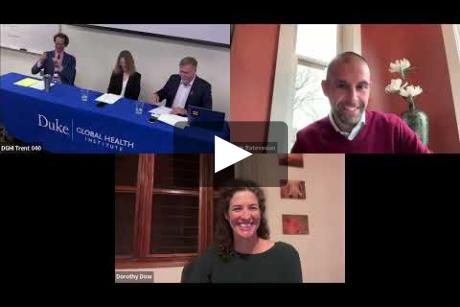Note: Each summer, nearly 100 Duke students spread out to more than a dozen countries to participate in global health field experiences, which help them understand the local context of global health challenges. This includes all students in DGHI’s Master of Science in Global Health program, who typically spend 10 weeks in the field to conduct research for their masters’ thesis. Joan Kimani, an MS-GH student who is doing her thesis research in Kenya, is catching up with a few of her classmates to see how their summers are going.
Tobenna Ndulue, a student in DGHI’s Master of Science in Global Health program, didn’t’ initially expect to be spending this summer in Cape Town, South Africa. It was only after matching with his mentor, DGHI associate professor Lauren Franz, M.B., Ch.B., that South Africa figured into his plans.
“We share a strong interest in mental health and neurodevelopmental conditions,” Ndulue says of Franz, a psychiatrist who is working to improve access to autism care in South Africa. “[That makes] this a perfect fit for my research interests."
This summer, Ndulue is conducting research as part of Autism Caregiver Coaching in Africa, a large study led by Franz that uses non-specialists to coach caregivers in skills to use with their young autistic children. His project involves exploring how caregiver characteristics and family structures affect the implementation of the coaching.
"Our goal is to see how this model works in Africa, focusing on low-intensity activities to support growth in social and communication skills in autistic children," he says.
Ndulue, who hails from Nigeria, is particularly interested in the role of non-specialists in providing this coaching, a crucial aspect given the shortage of professional mental health and child development workers in the region. This type of task-shifting approach is “essential in areas with limited access to mental health and child development professionals,” he notes.
But it is important for those approaches to fit local contexts, he adds. Validating the project’s measurements to the African cultural context is a significant emphasis of the team’s work, he notes.
Ndulue trained as a physician at the University of Ibadan in Nigeria and gained extensive experience working as a primary care physician, known as a medical officer in the British system, across urban, rural and suburban settings.
"I’ve always been passionate about health education and policy. My diverse experiences in these areas made me eager to explore global health further, leading me to pursue my master's degree,” he says.
Living in Cape Town has been a transformative experience for Ndulue. "Cape Town is a beautiful and diverse place, but it's also a city with significant inequalities, a legacy of its apartheid history," he says. "Being here has given me a deeper understanding of the social dynamics and challenges in implementing health interventions."
Ndulue hopes his research will help advocate for the role non-specialists can play in autism care. "Autism is often underrepresented in discussions about mental health and neurodevelopmental conditions in Africa. I hope my work encourages more research and awareness, leading to better support systems for affected families," he says.
Working in South Africa has also given Ndulue a chance to put into practice what he has learned in global health classes. "I’m applying skills from my coursework, especially in qualitative research, and learning new ones like psychometric analysis," he says. "This hands-on experience is invaluable and has greatly enriched my understanding of the field."
For those considering similar research paths, he stresses the importance of preparation and cultural sensitivity: "Stay open-minded, work hard, and always adhere to local guidelines and cultural norms,” he says. “It’s important to immerse yourself in the community and learn from the experience."



